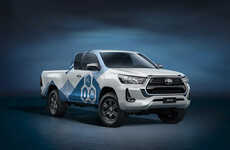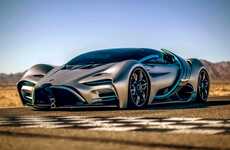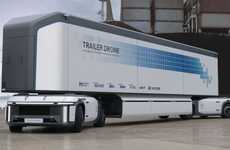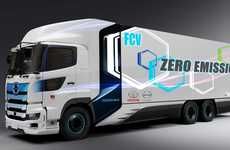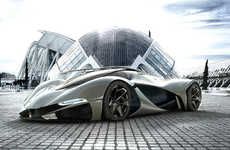
The Toyota Mira is An Eco-Friendly Technological Marvel
Rahul Kalvapalle — November 19, 2014 — Autos
The Toyota Mirai is a fuel cell vehicle that is the result of over two decades of research and development. Therefore it is fitting that the car is named 'Mirai', which means 'future' in Japanese. The car could mark a turning point in automotive technology what with its hydrogen powering system and fueling infrastructure.
The Toyota Mirai is equipped with a 153 horsepower plant, can cover 483 km on a single tank of hydrogen and can be refueled in only five minutes. It emits enough electricity to power a house for a week and emits nothing but water -- however it still offers dynamic handling and a low center of gravity.
The Toyota Mirai will be available for sale in late 2015 for $57,000, with Californians being the first able to lay their hands on this futuristic vehicle. The vehicle will then be available in the Northeast USA in 2016.
The Toyota Mirai is equipped with a 153 horsepower plant, can cover 483 km on a single tank of hydrogen and can be refueled in only five minutes. It emits enough electricity to power a house for a week and emits nothing but water -- however it still offers dynamic handling and a low center of gravity.
The Toyota Mirai will be available for sale in late 2015 for $57,000, with Californians being the first able to lay their hands on this futuristic vehicle. The vehicle will then be available in the Northeast USA in 2016.
Trend Themes
1. Fuel Cell Vehicles - The rise of fuel cell vehicles presents an opportunity for innovative companies to develop more efficient and sustainable transportation solutions.
2. Hydrogen Infrastructure - The need for a widespread hydrogen fueling infrastructure creates opportunities for companies to invest in building a network of refueling stations and distribution systems.
3. Green Automotive Technology - The demand for eco-friendly cars like the Toyota Mirai opens up possibilities for companies to develop and market sustainable automotive technologies.
Industry Implications
1. Automotive - The automotive industry has the potential to leverage fuel cell technology to create disruptive innovations that redefine the way people travel.
2. Energy - The energy industry can capitalize on the need for hydrogen production and distribution to power fuel cell vehicles, creating new opportunities for renewable energy sources.
3. Infrastructure - The development of a hydrogen fueling infrastructure requires collaboration from companies in the infrastructure industry to build a network of refueling stations and supporting systems.
4.1
Score
Popularity
Activity
Freshness



